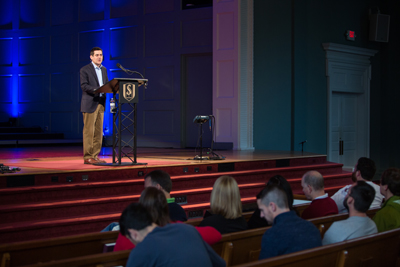Russell Moore propels Southeastern students onward to cultural engagement
January 19, 2017


As he wrapped up two days of lectures at Southeastern Baptist Theological Seminary, the President of the Ethics and Religious Liberty Commission (ELRC), Russell Moore, charged students to keep their focus on the gospel in an ever-changing culture. “Our future is not at stake as long as Jesus of Nazareth is still alive,” Moore encouraged. “He has promised in the short term a cross on our backs but in the long term a crown of glory.”
Every fall Southeastern holds the Page Lectures where outstanding theologians deliver lectures on a subject of concern to the Christian community. On November 3-4, Russell Moore gave two lectures exhorting students, faculty and guests to respond to present cultural challenges with confidence in Christ—messages from Moore’s newest book “Onward: Engaging the Culture Without Losing the Gospel.”
Moore is the eighth president of the ELRC of the Southern Baptist Convention. He plays a key role in connecting the agenda of Christ’s Kingdom to the culture of local churches for the sake of the gospel in the world.
For his first lecture, Moore spoke from Galatians and discussed what Christians should work to preserve in the 21st century. “We have come to a moment where we must recognize that God has called us uniquely to not only believe the gospel but to be people who are defined by the gospel,” Moore said.
Moore proposed that conserving gospel authority, community and ministry must be priorities in the church today. “If we are going to conserve the gospel for future generations, we must be people that know the authority of scripture and must not be embarrassed by the Bible,” Moore said. “What are we conserving?… If we are not conserving [the gospel] then we are not conservatives, just hoarders.”
Moore’s second lecture focused on 2 Chronicles 7:7-22, specifically the common American ideology of God and country. Moore recalled his own confrontation with this ideal as a child in cub scouts while trying to earn his “God and country” badge. After talking with a pastor during the badge process, Moore realized, “What the God and country badge was about for [the pastor] was not the truth of the scripture but about how religion could make us into good citizens.”
Moore then spoke to the reality that many times people allow enough religion into their doctrines or organizations to make people good citizens but not enough to make them strange. “God and country is much easier to teach and preach than Christ and him crucified,” Moore said.
To Moore, 2 Chronicles 7:7-22 is a text that faithful Christians in the 21st century have to confront. It is a text that has been misused to address the problems in American culture and how to solve them. However, Moore proposed that this scripture is not about a country acting better or praying to God more but about the cross of Jesus Christ and how the cross defines the people of God, the presence of God and the promises of God.
Because this passage and every other passage of the old covenant found fulfillment in the person of Jesus Christ, Christians should not be afraid according to Moore. If the cross defines God’s people, presence and promises, Christians should be free from all fear, even in a culture that sees the cross as strange. “People are so afraid in the culture right now that they just want to capitulate and give up Christian truth,” Moore said. “Some just want to double down and respond to the world with anger.”
Christians should, instead, cling to God’s promises and remember what Christ has done. “The worst thing that could happen to you has already happened,” Moore said. “The worst thing that could happen to you is to be crucified outside the gates of Jerusalem under the curse of God.”
He also reminded students, “The best thing that can happen to you is being raised from the dead, forgiven of sins, given an inheritance and seated at the right hand of God. You are already there because of Jesus.”
The two-day event also included a luncheon with faculty and Ph.D. students where Provost Bruce Ashford led an informal question and answer session with Moore. The library hosted a book talk where Moore answered questions about his new book, “Onward.” In both events, Moore continued to encourage students and faculty to stand up for the gospel and engage lost people in a new way, calling Christians the “prophetic minority,” a term from his book.
“It’s a prophetic calling we’ve been given as followers of Christ,” Moore said. “We have a message to speak, and we need to do that persuasively.”
Watch Moore’s lectures here.
View photos of the event here.